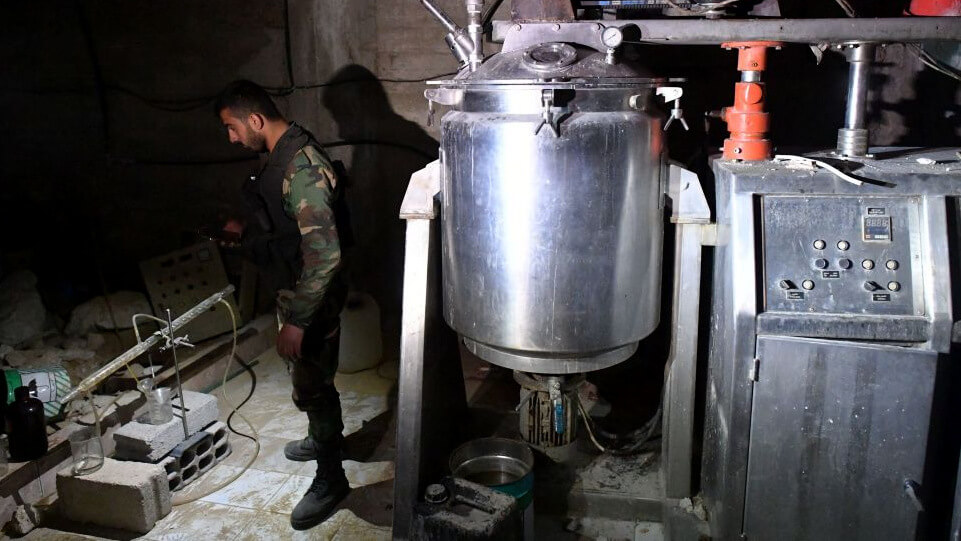NEW YORK — During a speech delivered on Tuesday to the United Nations Security Council, Syria’s Permanent UN Representative Bashir al-Jaafari claimed to have provided information to the council that was evidence that armed opposition groups, including Al Qaeda affiliate al-Nusra Front, were gearing up to use chemical weapons against civilians in the Syrian province of Idlib in an effort to frame the Syrian government for the attack.
Jaafari’s warning comes as Syria and its allies are preparing for a major military offensive that would target the rebel-held Idlib province, which even mainstream Western outlets admit is dominated by terrorist groups and their affiliates.
Speaking to the council, Jaafari stated:
I put in your hands documented information on the preparations taken by Jabhat al-Nusra [al-Nusra Front] terrorist organization and the affiliated groups to use the chemical weapons against civilians in Idlib province to accuse the Syrian Arab Army and to justify any aggression that might be launched on Syria.”
He added that eight canisters of chlorine had been transported to Halouz village in Idlib. The evidence Jaafari provided to the Security Council regarding an imminent “false flag” attack has not been made public.
Jaafari’s mention of chlorine gas being transported into Idlib follows similar warnings from Russia’s Defense Ministry, which warned in a statement on Tuesday that “a large supply of poisonous [chemical] agents has been brought to the city of Saraqib on two trucks from the village of Afs” and that the deadly cargo has been “accompanied by eight members of the White Helmets organization” and received by two high-ranking Ahrar al-Sham commanders.
Ahrar al-Sham has long been a battlefield ally of al-Nusra Front and The New York Times wrote in 2015 that its membership included associates of Osama bin Laden. In addition, the White Helmets group, which receives millions in funding from Western governments, has repeatedly been linked to falsifying evidence of both bombings and chemical weapon attacks in order to facilitate Western military intervention in the Syrian conflict.
The Russian military added that a part of the load was later put into “unmarked plastic barrels and transported to another militant base in southern Idlib in order to stage the use of chemical weapons.” It is currently unclear if the area of southern Idlib cited in this statement coincided with Jaafari’s statements that chlorine gas canisters had been delivered to Halouz village in Idlib with this intent.
Ominous signs of a repeat of a familiar script
Warnings from Syria’s UN representative and the Russian military follow hawkish statements recently made by members of the Trump administration, particularly National Security Advisor John Bolton, who stated last Wednesday that the U.S. would respond “very strongly” if the Syrian government is accused of chemical weapons use in Idlib. Bolton, speaking to reporters in Jerusalem, also boasted of the U.S.’ past responses to alleged Syrian government involvement in chemical weapons attacks on Syrian civilians this April and in April of last year.
This past April, the U.S. decided to stage a retaliatory attack before an independent inquiry could be launched, relying on testimonies and video footage, provided by the White Helmets and Saudi-funded terror group Jaish al-Islam, from the Damascus suburb of Douma.
A year prior, in April 2017, the U.S. launched an attack against Syria for allegedly using sarin gas in Khan Sheikhoun in the Idlib province. No independent investigation has ever been launched into the alleged attack — as UN-recognized investigators have been unable to reach the site, which is controlled by an Al Qaeda affiliate, for over a year. As with this past April’s “attack,” the U.S. had used “evidence” provided by Al Qaeda affiliate Hayat Tahrir al-Sham and the White Helmets to “prove” the Syrian government’s involvement.
Given recent warnings from both Syria and Russia, the events of the past two Aprils may soon repeat themselves in the coming weeks.
Top Photo | A Syrian soldier examines a chemical laboratory run by militants for the manufacture of poisonous substances and explosives in the basement of a home in a liberated suburb of Damascus. Mikhail Voskresenskiy | Sputnik
Whitney Webb is a staff writer for MintPress News and a contributor to Ben Swann’s Truth in Media. Her work has appeared on Global Research, the Ron Paul Institute and 21st Century Wire, among others. She has also made radio and TV appearances on RT and Sputnik. She currently lives with her family in southern Chile.


